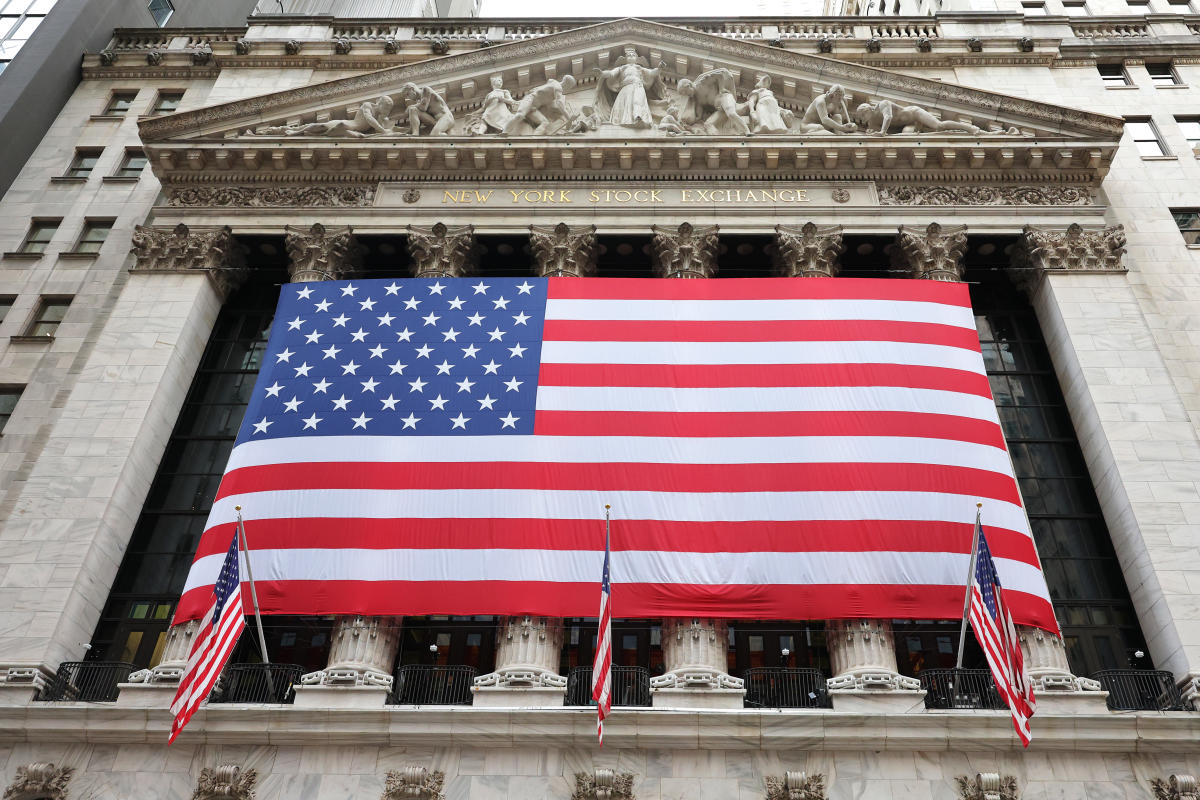All three major indexes pressed to record highs after Donald Trump won the 2024 presidential election.
For the week, the S&P 500 (^GSPC) and the Dow Jones Industrial Average (^DJI) rose more than 4.5%, while the Nasdaq Composite (^IXIC) rose nearly 6%.
In the week ahead, a fresh reading on inflation and retail sales will lead the economic calendar.
In corporate news, quarterly results from Home Depot (HD), Cisco (CSCO), and Disney (DIS) will highlight another week of earnings reports.
In a widely anticipated move, the Federal Reserve cut interest rates by 25 basis points last Thursday. In a press conference following the announcement, Fed Chair Jerome Powell declined to comment on the central bank’s plans for future rate cuts.
“We don’t think it’s a good time to be doing a lot of forward guidance,” Powell said. He later noted that Fed officials will need to gauge the economic data released between now and December before knowing if the central bank will cut interest rates again this year.
The first data the Fed will consider ahead of its next meeting will come out on Wednesday with the release of the October Consumer Price Index (CPI). Wall Street economists expect headline inflation rose just 2.6% annually in October, an increase from the 2.4% rise in September. Prices are set to rise 0.2% on a month-over-month basis, per economist projections, in line with the increase seen in September.
On a “core” basis, which strips out food and energy prices, CPI is forecast to have risen 3.3% over last year in October, unchanged from September’s increase. Monthly core price increases are expected to clock in at 0.3%, also in line with the September gain.
“The October CPI report will likely support the notion that the last mile of inflation’s journey back to target will be the hardest,” Wells Fargo’s economics team led by Jay Bryson wrote in a weekly note to clients on Friday.
The final monthly retail sales report before the start of the holiday shopping season is set for release on Thursday. Economists estimate retail sales increased 0.3% over the prior month during October. The control group of retail sales — which excludes several volatile categories like gasoline and feeds directly into gross domestic product (GDP) — is also expected to have risen by 0.3%.
Entering the release, several trackers point to the fourth quarter being off to a solid start for economic growth. The Atlanta Fed GDPNow tracker currently projects the US economy growing at 2.5%.
Disney is set to report quarterly results before the bell on Thursday as the media giant looks to continue to improve its streaming business amid further declines in linear television. Investors will also be focused on results within the company’s theme park business after the segment fell short in its most recent quarter.
Streaming profitability should be a bright spot after the company reported its first quarter of profits for that business in August. The segment should get a boost from recent price hikes along with the continued rollout of Disney’s password-sharing crackdown across its various platforms.
Shares are up about 9% this year.
In a roaring rally over the final three trading sessions of the week, much has been made about trades like financials that could benefit from President-elect Donald Trump’s policy.
Big Tech also saw significant upside. Roundhill’s Magnificent Seven ETF (MAGS) — which tracks Apple (AAPL), Alphabet (GOOGL, GOOG), Microsoft (MSFT), Amazon (AMZN), Meta (META), Tesla (TSLA), and Nvidia (NVDA) — hit a fresh record highs on both Thursday and Friday.
Three of the Magnificent Seven stocks, Tesla, Nvidia, and Amazon, outpaced the S&P 500 on the week, with Alphabet also coming close. Tesla had a unique Trump-related catalyst, with investors banking on CEO Elon Musk’s big bet on the president-elect’s campaign paying off.
Broadly, markets seemed to be pricing in the potential for less government regulation over Big Tech in a second Trump term. Perhaps indicative of the tech industry’s high hopes, Amazon founder Jeff Bezos, Microsoft’s Satya Nadella, Meta’s Mark Zuckerberg, and Alphabet CEO Sundar Pichai all rushed to congratulate Trump on his victory.
The week’s stock moves also coincided with a surge in Treasury yields, with the 10-year Treasury yield (^TNX) nearly hitting 4.5%. Strategists have often cited a “flight to quality” environment when yields rise, where money flows to large corporations with solid earnings growth and healthy balance sheets. Big Tech fits this mold and saw a rally when yields rose back in the spring.
Small caps were one of the beneficiaries of the post-Trump election rally. The Russell 2000 (^RUT) small-cap index jumped more than 5% on Wednesday for its best day in nearly two years. It closed the week up more than 8% for its best week since April 2020 and is now closing in on its all-time high.
This leaves investors with a question that’s been prompted throughout 2024: With the Fed set to keep lowering interest rates, is now the time to pile into small caps? In a Friday webinar, Piper Sandler chief investment strategist Michael Kantrowitz said not yet.
The index has more short-term debt than the S&P 500 and would be a clear beneficiary of lower interest rates. But it also has another key difference from large-cap indexes right now: Earnings estimates aren’t rising.
While Kantrowitz’s research shows 2024 full-year earnings estimates for the S&P 500 have increased over the last 90 days, earnings estimates for the small-cap S&P 600 (^SP600) index have been falling.
“In the last 20 days … we’ve definitely seen small cap estimates at the margin move pretty sharply lower,” Kantrowitz said.
He added that investors would want to see earnings accelerating to signal the start of a recovery.
“[It’s] not something we’re seeing quite yet,” Kantrowitz said. “So something we’ll be monitoring.”
Economic data: No notable economic releases.
Earnings: Live Nation (LYV), Monday.com (MNDY)
Economic data: New York Fed one-year inflation expectations, October (3.0% previously)
Earnings: Cava (CAVA), Hertz (HTZ), Home Depot (HD), Instacart (CART), Novavax (NVAX), Occidental Petroleum (OXY), On Holding (ONON), Plug (PLUG), Shopify (SHOP), SoundHound (SOUN), Spotify (SPOT)
Wednesday
Economic data: MBA Mortgage Applications, week ending Nov. 8 (-10.8% previously) Consumer Price Index, month-over-month, October (+0.2% expected, +0.2% previously); Core CPI, month-over-month, October (+0.3% expected, +0.3% previously); CPI, year-over-year, October (+2.6% expected, +2.4% previously); Core CPI, year-over-year, October (+3.3% expected, +3.3% previously); Real average hourly earnings, year-over-year, October (+1.5% previously)
Earnings: Cisco (CSCO)
Economic data: Initial jobless claims, week ending Nov. 9 (225,000 expected, 221,000 previously); Producer Price Index, month-over-month, October (+0.2% expected, 0% previously); PPI, year-over-year, October (+2.3% expected, 1.8% previously)
Import prices, month-over-month, January (-0.1% expected, +0.0% previously); Export prices, month-over-month, January (-3.2% previously); Industrial production, month-over-month, January (+0.4% expected, +0.1% previously); NAHB housing market index, February (44 prior)
Earnings: Advance Auto Parts (AAP), Applied Materials (AMAT), Disney (DIS), JD.com (JD), Oklo (OKLO)
Economic data: Retail sales, month-over-month, October (+0.3% expected, +0.4% previously); Retail sales ex-auto and gas, October (+0.3% expected, +0.7% previously); Import price index, month-over-month, October (-0.1% expected, -0.4% prior); Industrial production month-over-month, October (-0.2% expected, -0.3% prior)
Earnings: Alibaba (BABA), Spectrum Brands (SPB)
Josh Schafer is a reporter for Yahoo Finance. Follow him on X @_joshschafer.
Click here for the latest stock market news and in-depth analysis, including events that move stocks
Read the latest financial and business news from Yahoo Finance
EMEA Tribune is not involved in this news article, it is taken from our partners and or from the News Agencies. Copyright and Credit go to the News Agencies, email news@emeatribune.com Follow our WhatsApp verified Channel




